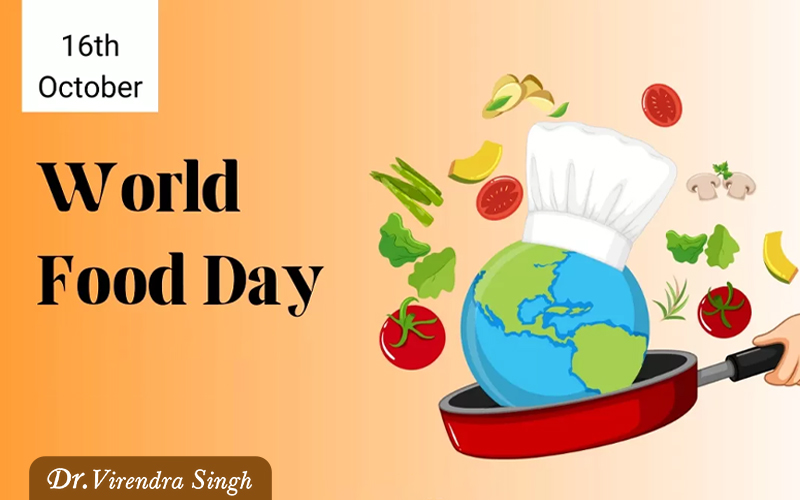
World Food Day, which was first observed in 1979, occurs on October 16 of each year to raise awareness of hunger and to encourage action for the earth, people, and food in the future. This day, which was created by the Food and Agriculture Organization (FAO) of the United Nations, emphasizes the significance of developing sustainable food systems and making sure that everyone has access to wholesome food. In 2024, the focus remains on uniting efforts to combat hunger, address climate change’s impact on agriculture, and support small-scale farmers. World Food Day serves as a reminder that eradicating hunger is a common objective for everyone’s health and sustainability as well as a responsibility.
Dr. Virendra Singh, a distinguished pulmonologist, brings a unique perspective to World Food Day 2024 by highlighting the connection between nutrition and respiratory health. As a pioneer in the field of lung health, Dr. Singh highlights the significance of a nutritious, well-balanced diet for preserving robust respiratory health, particularly in groups susceptible to respiratory disorders and air pollution. His guidance emphasizes how a diet rich in nutrients can improve overall health outcomes, lower the likelihood of developing chronic lung problems, and increase immunity.
What is the Theme for World Food Day 2024
The Theme of World Food Day 2024 is “Right to Foods for a Better Life and a Better Future.” Food is recognized as a basic human right by the UN’s Universal Declaration of Human Rights and two legally binding international agreements, and the globe produces enough food to nourish all of its population. It is also recognized as the third most basic human necessity, after air and water.
Yet hunger still persists for 10% of the global population. Furthermore, just having something is insufficient. The Food and Agriculture Organization is advocating for everyone’s right to a varied, nutrient-rich diet that is inexpensive, readily available, and safe as part of this year’s World Food Day theme.
History of World Food Day
World Food Day was first observed in 1945 by the Food Agriculture Organization (FAO), a specialized agency of the United Nations. However, it wasn’t formally acknowledged until the 20th FAO conference in November 1979. One hundred fifty countries have honored it since then, and the United Nations has recognized it. The very aim behind this celebration’s establishment is to spread awareness of the need to end rural poverty and feed the world.
Every year, various facets of food security, agriculture, biodiversity, fishing communities, and climate change are highlighted in celebration of this annual event. These aspects are reflected in the World Food Day 2024 theme as it focuses on safely producing and consuming food.
The Role of Technology and Innovation
Advancements in technology play a crucial role in addressing food security. Precision farming, biotechnology, and data-driven agricultural techniques are examples of innovations that can boost crop yields, cut waste, and enhance the effectiveness of food production and distribution. Additionally, farmers and legislators can gain important insights by utilizing digital platforms and data analytics. Let’s explore technology and innovation’s contribution to food security in more detail:
- Precision Agriculture: Smart farming, often known as precision agriculture, is the application of cutting-edge technologies to maximize farming techniques. This method customizes farming procedures for optimal productivity by utilizing data, sensors, and automation. Some key components of precision agriculture include:
- Satellite Imaging: High-resolution cameras and sensors mounted on satellites allow for the monitoring of pest infestations, soil quality, and crop health. These real-time photos are available to farmers so they may use data to inform their decisions about fertilization, irrigation, and pest management.
- IoT and Sensors: Internet on Things (IoT) devices such as soil sensors, weather stations, and localized data on soil moisture, crop growth, and weather conditions.
- Automated Machinery: Precision is enhanced by the use of automation and GPS technology in tractors and other farm equipment. This reduces overlap in planting and harvesting, saving resources and improving crop yields.
- Biotechnology: Through the creation of genetically modified organisms (GMOs) that improve crop resistance, nutrition, and overall performance, biotechnology has completely transformed agriculture. Innovations in biotechnology include:
- Drought-Resistant Crops: Researchers have created crop varieties resistant to drought that can grow in areas with limited water supplies, assisting farmers in continuing to produce even under difficult circumstances.
- Pest-Resistant Crops: Due to their ability to fend off some pests, genetically modified crops require fewer chemical pesticides and experience lower harvest loss.
- Nutrition Enhancement: Biofortified crops, like vitamin-enriched rice, provide better nutrition, especially in regions where deficiencies are common.
- Data-Driven Practices: The field of data analytics is revolutionizing modern agriculture. It makes it possible for farmers and decision-makers to make well-informed choices and projections using a wealth of data.
World Food Activities
Every year, on October 16, World Food Day is observed to raise awareness and encourage action on issues pertaining to food and nutrition. Here are some common activities organizations and people engage in to mark this day:
- Educational Workshops and Seminars: Organizing programs to inform the public about nutrition, sustainable agriculture, food security, and healthful eating habits.
- Community Feasts and Food Drives: Arranging food drives and meals for the underprivileged in order to combat hunger and food inequity.
- Cooking Demonstrations and Classes: Providing wholesome, locally sourced, and sustainable ingredients as the main focus of cooking classes to encourage a balanced diet.
- Awareness Campaigns: Publish fliers, posters, and social media campaigns to raise awareness of food-related concerns and inspire people to take action.
- Fundraising Events: Hosting charity events, donations, or auction drives to support organizations working on food security and hunger relief.
- Farm Visits and Agricultural Exhibitions: Organizing farm tours or holding exhibitions to highlight local food production and sustainable agricultural methods.
- School activities: Conduct activities and special programs in schools to educate children about the importance of nutrition and food sustainability.
FAQs
What is World Food Day?
Every year on October 16, the world observes World Food Day, an occasion to raise awareness of hunger and inspire action for those in need as well as to emphasize the significance of sustainable agriculture, a wholesome global food system, and food security.
What is the Theme for World Food Day 2024?
The Theme of World Food Day 2024 is “Right to Foods for a Better Life and a Better Future.”
Why is World Food Day celebrated?
World Food Day is observed to raise awareness of world hunger and malnutrition, to support sustainable farming methods, and to foster cooperation between governments, groups, and people in order to eradicate hunger by tackling problems including poverty, climate change, and food insecurity.
Who organizes World Food Day?
The Food and Agriculture Organizations (FAO) of the United Nations organizes World Food Day, which is supported by numerous countries, NGOs, and organizations around the world in an effort to raise awareness of global food challenges.
Why is food security important?
Food security ensures that everyone has reliable access to sufficient, safe, and nutritious food. It’s crucial for economic development, social stability, and health. Taking care of food security promotes sustainable development and environmental preservation while assisting in the reduction of hunger, malnutrition, and poverty.
